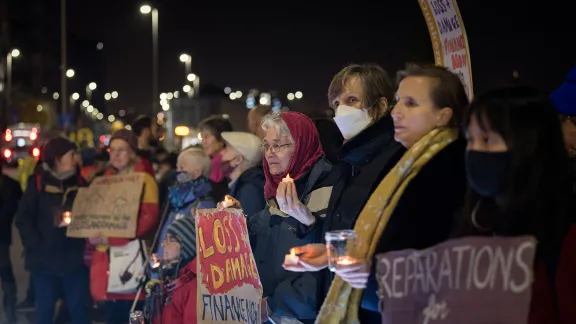
People of different faith traditions gather for a silent vigil in Glasgow, during the COP26 summit, to remember all those suffering from the impact of climate change. Photo: LWF/A. Hillert
Ecumenical organizations call for bold economic policies to end exploitation of people and planet
(LWI) - Calls for a more just global taxation system were at the heart of the recent COP26 People’s Summit side event “Tax the Rich, Save the Planet”, with faith-based activists calling for an economic order that can make reparations for past exploitation of people and the planet. In order to both educate and enable churches to support this campaign for greater fiscal justice, the Lutheran World Federation (LWF) and partners have published a new online resource called the ZacTax Toolkit.
The Zacchaeus Tax campaign was launched in the summer of 2019 at the United Nations in New York. It is an ecumenical initiative supported by the LWF in partnership with the World Communion of Reformed Churches (WCRC), the World Council of Churches, the Council for World Mission and the World Methodist Council, within the framework of the New International Financial and Economic Architecture (NIFEA) project.
The name of the campaign is inspired by the tax collector named in St Luke’s gospel who was transformed by an encounter with Jesus and made reparations for his past exploitation of the poor in first century Palestine. When Jesus speaks to Zacchaeus, who had climbed up into a sycamore tree to get a better view, the wealthy tax collector announces that he will give half of all his possessions to the poor and pay back fourfold anything that he had taken illegally.
This educational resource equips churches with theological reflections, policy insights, and practical ways that strengthen local and national action.
The campaign addresses injustices including colonialism and slavery, as well as ecological exploitation, calling for a ‘pollution tax’ and other fiscal measures to create a more equitable economic system. The introduction to the new toolkit explains why churches “can and ought to play an important role in encouraging national and international systems of that reward work and redistribute gains, promote gender justice and ecological sustainability,” while penalizing those who participate in “speculative, polluting and resource-depleting activities.”
The toolkit includes chapters on the Zacchaeus story and the theology of taxation, as well as practical suggestions for churches’ engagement and a section for children reflecting on the concept of the common good. Its aims echo the urgent appeal made by religious leaders to heads of the G20 nations ahead of their Rome summit at the end of October, calling for a “reset” of the world’s current development model “founded upon fossil fuel-driven economic growth.”
Rev. Dr Sivin Kit, LWF’s Program Executive for Public Theology and Interfaith Relations said: “Impactful global advocacy that promotes a redistribution of resources towards impoverished communities to combat poverty and protect the planet is rooted in our collective efforts from the ground up. This educational resource equips churches with theological reflections, policy insights, and practical ways that strengthen local and national action for a better future for all.”
LWF/P. Hitchen


